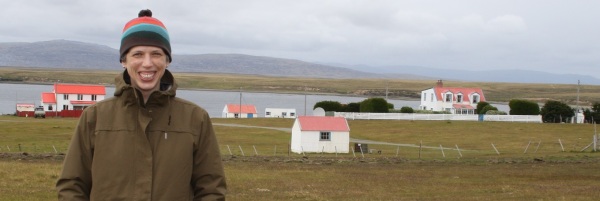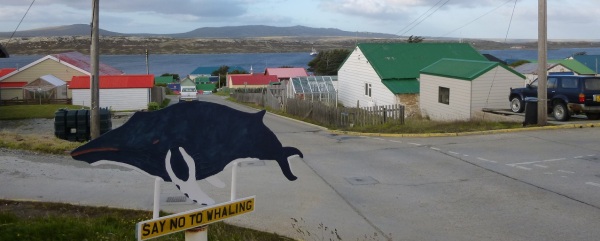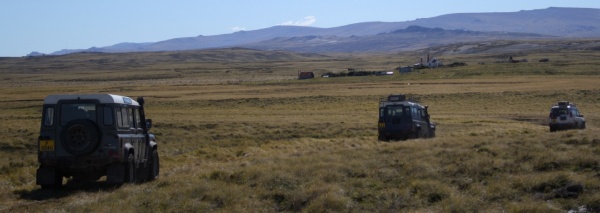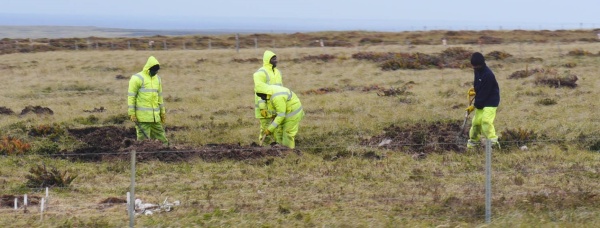Guest post by Kate Sherren

Captions: Wharves in Stanley, the Falklands capital. To the left, the Government Wharf which is busy with oil and gas exploration logistics.
Change is coming to the Falkland Islands. For generations, the Islands’ economy has relied upon industries based on renewable ecosystem services: livestock grazing, fishing (particularly squid), and increasingly tourism, such as Antarctic cruise ships. Following recent successful exploration for oil and gas in its exclusive economic zone, extraction of those petrochemicals will likely follow, barring significant changes to global consumption habits or oil and gas markets. The people of the region are aware that an oil and gas boom has potential implications for the culture and ecology of the region. This was one of the triggers for the recent Falkland Island Science Symposium, which brought a dozen pan-American scholars to its capital for a week of meetings and field trips. Diplomacy was also an explicit goal: as Argentina declares on busses and banknotes that the Islands are theirs, the Falklands are moved to increase their profile in the region, as a nation to its neighbours. Science is a useful avenue to diplomacy, but it also simply makes sense to improve networks with scholars in places with similar geographies and interests. Finally, it was a bit of a coming-out party for the nascent South Atlantic Environmental Research Institute, which is a growing hub for research on the South Atlantic. Lacking a university affiliation, SAERI needs research collaborations for access to graduate students and to broaden its funding base.

Caption: Thousands of whalebones covered this beach, the site of many strandings, when the delegation visited.
The Falkland Islands – a small archipelago east of Patagonia – has a singular culture and environment. Predominantly of Commonwealth stock, the few thousand Falkland citizens inhabit a geologic ‘crumb’ of Africa, left behind from the breakup of Gondwana, which boasts five species of penguin but no native trees. Stepping outside in the capital, Stanley, the predominant smell is burning peat, still cut from local peatlands and part of the home heating fuel mix. Despite its status as a British Overseas Territory (over continued control of which the British fought the ten-week Falklands War in 1982 against Argentina), the Falkland Islands are self-governing, and its people pride themselves on self-sufficiency. Their sense of place is very strong: it is not easy to live here, and the people’s connection to the landscape is intense. All this enforces a sustainability mindset – with limited extent, remote geography and regional tensions, Falklanders must manage with the long game in mind.
I was the only social scientist (loosely defined) in that pan-American science delegation: I’m a place-oriented scholar of landscape multifunctionality who uses visual and spatial methods. My co-delegates were experts in marine, atmospheric and terrestrial science, from microbes to whales, minute mosses to large-scale climate patterns. Like others, my immersion in this novel social-ecological system inspired numerous research ideas. As a social scientist, however, what among my co-delegates probably only gave me pause was precisely the novelty of the setting: would lessons from research here be applicable anywhere else? Of what else could a Falklands case study be considered an example? By the end of the week, I had come to believe that the Falklands were the perfect sustainability lab. Not only is there plenty of work that can be done there to inform the Islanders, but that would could produce more generalizable insights.

Caption: Kate Sherren, overlooking the farm settlement at Volunteer Point, heading to see the King penguins. The next two hours was all off-road, but we only travelled 15 km.
The Falkland Islands are a remarkable microcosm. Despite the small size and population, the Islands have to sustain a bespoke legislative, policy and regulatory environment. Nothing could be transplanted from another context and be expected to work. These legislators, policy-makers and regulators live in very close proximity to the people and industries they seek to govern or influence. I met one young member of the legislature, pushing his bike up the hill at the end of the day with groceries in tow. This proximity makes them responsive: one legislator said they consult often, perhaps too often. This kind of government has the potential to be very nimble, compared to most, and open to novel approaches to governance. They are building the policy environment for oil and gas as we speak, and are currently funding a baseline study of socio-economics so they can monitor the impact of oil and gas exploitation on the people and economy. This is impressive forethought.

Caption: Stanley, the capital, looking toward the harbour. In the foreground, one of the many signs a local metalsmith placed around town decades ago to lobby for the end to whaling. His yard is now an ad-hoc museum to the battle, including harpoons and whale skeletons. In the background, several family greenhouses.
The scale of the Falkland Islands also renders it sensitive to change. In few places could the ‘limits to growth’ be so readily tangible. Its landscape and society will feel quite quickly the marginal change caused by an influx of population to serve the oil and gas industry and its spinoffs. Waste management is a huge issue, as is food supply. Many homes and farms grow their own food, in greenhouses to beat the constant winds. Moreover, however, many citizens I spoke to were wary of the population changes, especially the fly-in, fly-out, male-dominated demographic often involved and its accompanying vice. Stanley is a baby boomtown, relatively speaking, and with extractive industries this implies a future bust. The Islanders wish to capitalize on this new resource, but make sure there is something recognizable left (indeed, cherishable) when it is gone. After all, it is already wealthy without this industry – there is no poverty or unemployment. While oil and gas operations there have been carefully negotiated to involve negligible on-shore processing, to avoid negative local impact, that decision may increase the risk of spills at sea.
So many aspects of the wider world are at play here, and perhaps overlap more because of the geography. The Falklands are what the Satoyama Initiative would call a ‘social-ecological production landscape and seascape’. So why isn’t it lousy with researchers? It takes a very long time to get there. Only one weekly LAN flight from Santiago, Chile, or the so called ‘air bridge’ from a UK base. And did I mention the mines? I was there at the beginning of the 2015 mine clearing season. A company from Zimbabwe had been hired to do the work, and their high-viz yellow suits were prominent along the roadsides. Britain has taken over the responsibility for clearing the mines since the 1997 Ottawa Treaty. Minefields don’t really get in the way – they’re clearly fenced and in fact serve as useful conservation areas (except if they go off, I suppose, but I’m assured this is uncommon). More problematic is the lack of infrastructure. Very little is paved outside Stanley. Everyone owns Landrovers, the only vehicle that can handle the terrain.

Caption: Our landrovers, driven by outstanding local guides who also own the Estancia farm. These women really know how to drive, and clearly enjoyed it: lots of joking over the radio, especially if anyone got bogged and needed rescuing!
Internet is also unpredictable, costly and patchy. This had benefits, however. It was such a pleasure to have people meet your eyes as you met them in the street – it was like ten years ago compared to our smartphone fixations. This lack of internet distraction may in fact have contributed to my sense of immersion in the place. Paradoxically, the Falkland Islanders have embraced social media such as Facebook. One page hosts the equivalent of eBay called ChayBay (Chay being their local word for ‘buddy’, a variant on ché) for buying, selling and trading. Many older Falklanders mourned the loss of former collective living models, including the fragmentation of the small villages on the large company-owned farms when they were split and sold to families after the Shackleton Reports on the economic development of the Falklands in 1976 and just post-war. Even party phone lines were somewhat missed, for the cohesion they wrought. Each day the line was open for the ‘doctor’s hour’, when anyone could pick up the phone and tell the GP (and other listeners) their troubles. No wonder they’re all taking to social media.
Maybe you can tell, the Falkland Islands really got under my skin during my visit. I am convinced the Islands are a rich potential site for sustainability science research, and that there are many ways that a Falklands case study would reflect back on our wider global challenges. Watch this space.
To get in touch with Kate, you can email her at Dalhousie University’s School for Resource and Environmental Studies, via kate.sherren@dal.ca.



Pingback: Weatherland II – Epic Skies | Kate Sherren